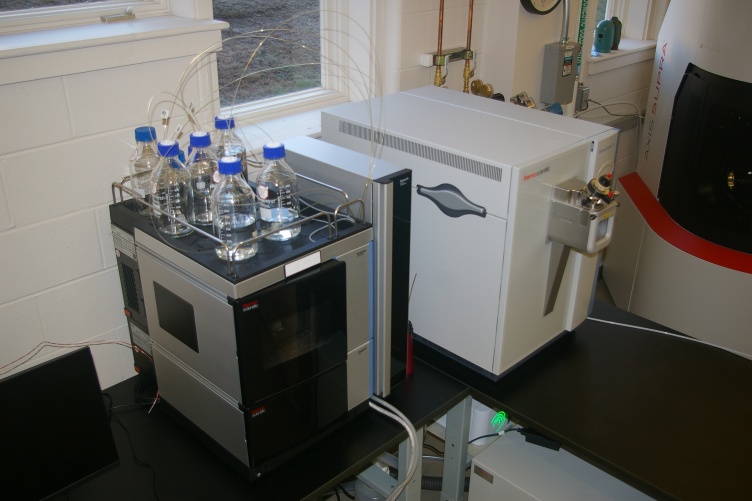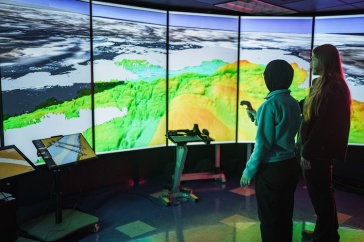
One of two instruments that form the University Instrumentation Center's mass spectrometry core in Parsons Hall.
Two new scientific instruments will let researchers measure the weight of molecules — and advance our understanding of Alzheimer’s disease, soil microbes and contaminants like PFAS, addiction and more.
The instruments, called mass spectrometers, measure molecular weight. “Mass spectrometers essentially are like scales,” says professor of molecular, cellular and biomedical sciences Feixia Chu, who received a $1.1 million National Science Foundation grant for one of the instruments. Molecules with different molecular weights have distinct properties, she says, information that can be used in conjunction with other biochemical processes to identify and quantify proteins and modifications that reveal complicated, sophisticated processes inside the cell. “It’s more and more becoming the method of choice in cell biology discoveries,” she adds.
The ThermoFisher Orbitrap Ascend Tribrid mass spectrometer acquired by Chu’s grant will join one funded by a USDA grant to professor of soil biogeochemistry and fertility Stuart Grandy and Paula Mouser, professor of civil and environmental engineering, in a mass spectrometry core facility located at the University Instrumentation Center in Parsons Hall. There, the two state-of-the-art instruments will be accessible to not only the three principal investigators but to the myriad of researchers within and beyond UNH who will use them to tackle a wide range of biological questions.
“We can use it for almost everything related to biology, from environmental biology to medicine.”
“We can use it for almost everything related to biology, from environmental biology to medicine,” says Chu. Her primary use for the instrument will be in research, in collaboration with Memorial Sloan Kettering Cancer Center and funded by the National Institutes of Health, on the underlying mechanism of Alzheimer’s disease.
For Grandy and Mouser, their ThermoFisher Orbitrap Exploris 120 mass spectrometer is helping them get the dirt on dirt. Grandy uses it to pinpoint which organic inputs — nutrients and minerals from fertilizer, compost or other sources — contribute to building soil organic matter.
“Understanding soil organic matter from these angles is the key to developing more nutrient efficient cropping systems that do not lose nitrogen and phosphorous to the environment,” says Grandy. “Soil organic matter also stores carbon, helping to reduce in the atmosphere the concentrations of the greenhouse gas carbon dioxide.”
Mouser is measuring microbial lipids and organic contaminants in soils, water, wastewater and sludges. She’ll also utilize this instrument to measure emerging contaminants such as per- and polyfluoroalkyl substances (PFAS). “This instrument significantly expands our ability to measure emerging contaminants in the environment and assess how well our engineered systems are doing in removing or mitigating those contaminants,” she says.
The researchers anticipate these two instruments will serve dozens of UNH researchers spanning multiple departments and colleges. Associate professor of psychology Sergey Charntikov will use it in his studies of addiction, for instance, and mass spectrometry will help Kyung Jae Jeong and Edward Song, associate professors of chemical and electrical engineering, with engineering muscle cells and biosensors. Additionally, researchers from across the university will use it to reveal key players and potential targets in research ranging from cancer to depression to solar energy.
The new instruments will also improve researchers’ efficiency. “They’re faster and able to answer a lot of questions we previously wouldn’t be able to answer,” says Chu. “I’m going to use it for almost everything I work on.”
For more information on the University Instrumentation Center’s mass spectrometry core, contact UIC director Shawn Banker.
-
Written By:
Beth Potier | UNH Marketing | beth.potier@unh.edu | 2-1566
















































